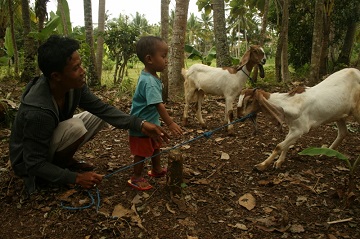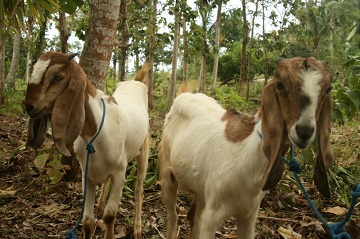AUGUST 15, 2013 – Friends of the National Parks Foundation’s (FNPF) new goat farming microfinance project aims to help improve the lives of a group of villagers on Nusa Penida island.
We shipped 50 goats to Nusa Penida, just off the coast of mainland, the home of our bird sanctuary, in June. The goats, a mix of males and females, have been loaned to 23 subsistence farmers in the island’s south.

This father and son are among those from Saren village on Nusa Penida island, just off the coast of mainland Bali, who will benefit from our new goat microfinance project.
Goats on a two year loan
“We’ve lent the farmers these goats to breed – they can then rear the offspring and eventually sell the animals for their meat,” said FNPF’s CEO and Founder Dr Bayu Wirayudha. “The idea is to provide the farmers with an extra income source and so help improve their standard of living.
“For each goat they are given the farmers must return a new goat to us – of the same size and sex – in two years’ time. The project is designed so that the goats are given to groups of farmers, rather than to individuals, so there’s collective responsibility for their wellbeing.”
Home of our bird sanctuary
FNPF, with the backing of the island’s villages turned Nusa Penida into a one-of-a-kind sanctuary for birds in 2006. For more than seven years we have been working on the island to rebuild numbers of the Bali starling, one of the most worlds’ most endangered birds and Bali’s emblem. Back when we started there were believed to be fewer than 10 birds surviving in the wild in Bali, today there are estimated to be more than 100 living on the island.
“We believe conservation projects have to be holistic to be effective, and so must involve local communities. On Nusa Penida we run development programs designed to improve community wellbeing, including projects, like this one, through which people learn about environmentally-friendly ways to make a living,” said Dr Wirayudha.
Changing livelihoods for locals
Made Sintu, one of the farmers benefiting from the project, has been looking after some of the goats for six weeks. He said there was plenty to feed the animals and so far it had not been hard to learn how to care for them.
The Saren village farmer, who supports a wife and eight children, makes his living from farming a cow, chickens and pigs. He hopes his involvement in the project would help make his life a little easier.

Some of the 50 goats we have sent to Nusa Penida to help improve the livelihoods of Saren village farmers.
Rotary backing for project
The goat microfinance project is funded by the Rotary Club of Bali Seminyak, who recently visited Nusa Penida to check progress. “I was surprised and impressed with all these fantastic goat cages (the farmers have built) – I thought it would be more simple actually – I was very impressed,” said club member Peter Erni, who is coordinating the project for Rotary. “It’s an interesting program.”
The Rotary Club of Bali Seminyak also funds FNPF’s scholarships for students on Nusa Penida and is this year donating to help run our student art recycling competition, part of Indonesian Independence Day celebrations on Nusa Penida this month.
Dr Wirayudha said if FNPF is able to secure further funding it hopes to extend the goat farming microfinance project to other villages on the island.
If you are interested in getting involved in this microfinance project please contact us oninfo@fnpf.org or you can phone us on +62 361 977 978.







